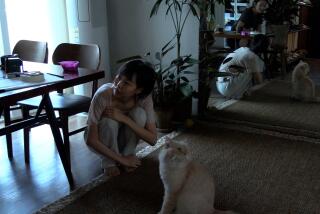MOVIE REVIEW : ‘Qiu Ju’: Razor Tied With Silk, Cotton
- Share via
The face of Chinese actress Gong Li--star of all Zhang Yimou’s films and the title character player in his latest “The Story of Qiu Ju” (Royal)--is heart-fresh, bewitchingly lovely, a movie goddess’s face. But it’s also enigmatic, changeable; it can go orchid-soft or, as in “Qiu Ju,” steely hard. Playing a stubborn peasant woman who carries her case against an equally stubborn village chief relentlessly all the way from local police to county and city governments and finally to the high courts, she’s dressed down drastically here from her previous roles for Zhang.
Eyes opaque, mouth sullen, notably pregnant for most of the movie, Gong Li’s Qiu Ju is wrapped in dowdy farm clothes: black slacks and bulky jackets, a far cry from the shimmering silks of “Raise the Red Lantern” or “Red Sorghum.” Even her temperament is thicker. Moviegoers ready to sympathize with any individual bucking the system will have a harder time with Qiu Ju, whose quest is comic, and whose motives seem increasingly confused or petulant.
*
Upset because her husband was kicked in the “privates” or “family jewels” by the chief, and because the chief, contemptuous, won’t “explain” his actions, Qiu Ju carries her vendetta past self-interest and reason, bullying her way toward a scathingly ironic climax.
Brilliance shines in any setting, and both Gong Li’s acting and Zhang Yimou’s sensibility break through dazzlingly again here. “The Story of Qiu Ju” was the last Venice Film Festival Grand Prize winner, yet even veteran Zhang Yimou watchers will be surprised at some of it. This is a movie about today’s China, Zhang’s first contemporary-set film to reach the U.S., and, in it, he alters his style as radically as Gong Li refashions her face.
Zhang’s previous pictures were stylized, almost rapturous. They told fatalistic stories of destructive passions in rigid or unjust societies, their near-melodramatic plots caught in exquisite colors and painterly frames and his prime models seemed to be Japanese or American period films. Here, he seems inspired instead by Italian neo-realism, “street” movies and modern documentaries.
Trying to get their artless, unstaged feel, Zhang primarily uses a hidden camera. Only four of the actors--including Gong and Lei Lao Sheng, who plays the chief--are professionals. For the rest, Zhang simply lets life crowd into his frames. In the key first shot of the film, a mass of hundreds of pedestrians on city streets streams past the camera obliviously, until we pick out Qiu Ju, her sister-in-law and Qiu Ju’s prostrate spouse, being pushed to the doctor’s in a barrow.
At the center of this vast, various tapestry, Qiu Ju and the chief--immovable object, irresistible force--play out their curious, quiet vendetta of “losing” and “keeping” face, surrounded by cunningly drawn characters, such as kindly Officer Liu, who says he’s better at finding stray cows than settling disputes, or the letter-writer who claims his “merciless” missives often result in death sentences for the target. So muted and subtle is the picture, it gives off such an air of steaming rice bowl camaraderie, polite talk and picaresque bustle, that we may not notice the precipice of misunderstanding toward which it ambles.
In a free society, we expect irreverence, and sometimes even outrageous invective about political systems. In a closed society such as China’s, even a little irreverence, as gently witty as this, constitutes an act of deep courage and focus--particularly from a filmmaker like Zhang, whose last few movies were not exhibited in his homeland.
Yet those looking for simple political cliches--the defiant individual, the brutal godless system--won’t find them here. Zhang’s film doesn’t suggest Tian An Men, but something different: the silliness, incompetence and artificiality of vast bureaucracies, which ultimately work less well than the simple, human interactions of the peasant village.
This theme is neither conservative nor radical. Zhang’s concerns are timeless: Truth, beauty. In a year already rich in foreign imports, this great movie performs a crucial transforming function: It opens up a new territory, reshapes our vision. But it does so softly, humorously, in a muted, careful tone that disguises the keenness of its irony, the edge of its insight. “The Story of Qiu Ju” (MPAA-rated PG) is a razor wrapped in silk and peasant cotton, so carefully deployed that not even the tiniest threads break.
‘The Story of Qiu Ju’
Gong Li: Qiu Ju
Lei Lao Sheng: Village Chief
Liu Pei Qi: Qiu Ju’s Husband
Ge Zhi Jun: Officer Li
A Sony Pictures Classics Release. Director Zhang Yimou. Executive producer Ma Fung Kwok. Screenplay by Liu Heng. Cinematographers Chi Xiao Ling, Yu Xiao Qun. Editor Du Yuan. Music Zhao Ji Ping. Sound Li Lan Hua. Running time: 1 hour, 54 minutes.
MPAA-rated PG.
More to Read
Only good movies
Get the Indie Focus newsletter, Mark Olsen's weekly guide to the world of cinema.
You may occasionally receive promotional content from the Los Angeles Times.










